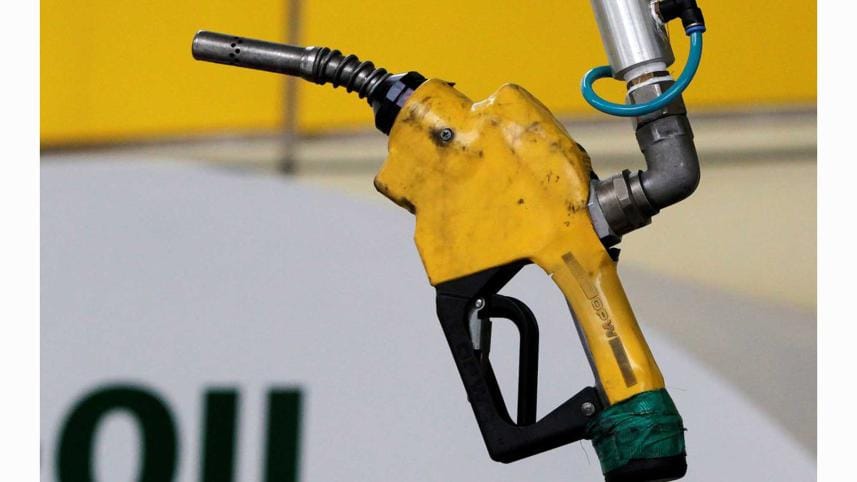Automated fuel pricing likely from next quarter

"They have given us a formula and we are looking into it." Nasrul Hamid, state minister for power, energy and mineral resources
The government is likely to introduce dynamic fuel pricing next quarter -- a development that will dramatically lessen the subsidy burden and pave the way for enhanced social spending.
Under dynamic fuel pricing, which is followed by most countries, local prices are synced with international ones, reflecting the fluctuations in the global market. To put it simply, if the prices go up in the international market, they will automatically increase in the local market and vice versa.
The pricing system, which was introduced in neighbouring India in 2017 with great success, has long been a demand of economists and multilateral lenders due to the inefficiency of the existing subsidy-reliant administered pricing mechanism.
Other than distorting the prices, the artificially low price at the cost of taxpayers' money benefits the rich and poor alike, and it is largely the well-off who are vehicle owners. That money could instead be used in the health and education sectors and for making the social safety net schemes meaningful.
Keeping populism in mind, the government has so far resisted a shift away from administered pricing and continued to bear progressively larger subsidy bills.
For instance, a record Tk 82,745 crore has been earmarked in this fiscal year's budget for subsidy, up 53.7 percent from the previous year's original budget.
It has now softened its stance in the face of extended periods of elevated prices in the global market and the strain on the balance of payment and foreign currency reserves, The Daily Star has learnt from people familiar with the discussions, who requested anonymity to disclose sensitive deliberations.
Besides, the automated pricing mechanism is tipped to be one of the conditions for the $4.5 billion loan from the International Monetary Fund.
The loan proposal is expected to be placed before the IMF board in early January and the government needs to commit to prior actions before then.
While the visiting IMF staff mission has called for dynamic pricing for fuel, gas, electricity and fertiliser, the government has intimated that it would be willing to adopt the system for just the fuel prices for now, according to two people involved with the proceedings.
However, the subsidy for gas, electricity and fertiliser will be brought down gradually.
"They have given us a formula and we are looking into it -- it is nothing binding," Nasrul Hamid, the state minister for the ministry of power, energy and mineral resources, told The Daily Star yesterday.
He would not elaborate on the matter.
The power, energy and mineral resources ministry though has already started work on the automated fuel pricing mechanism, The Daily Star has learnt from people involved with the exercise.
It is yet to be decided whether the pricing mechanism will be based on a 15-day rolling average international rate or a three-month average.
Whether the Bangladesh Petroleum Corporation would oversee the system or the Bangladesh Energy Regulatory Commission remains to be fixed.
In India, the pricing of petrol and diesel is done through a 'daily pricing' mechanism based on a 15-day rolling average international rate, the exchange rate, tax structure, inland freight and other costs.
Every day at 6:00 am, the price of petrol and diesel is revised by the oil marketing companies, ensuring that the benefits of the smallest change in international oil prices are passed on to the consumers.
The process is overseen by the Petroleum Planning and Analysis Cell under the ministry of petroleum and natural gas.
"This is how the fuel prices are set in the rest of the world --there will be no criticism of the government when the price goes up," said Ahsan H Mansur, executive director of the Policy Research Institute of Bangladesh.
At present, there are similar pricing mechanisms in place for gold and liquefied petroleum gas: their prices are adjusted frequently in line with the movements in the international market.
The government's subsidy expenditure will be stable and the budget's predictability will be better, Mansur added.
Were the dynamic pricing mechanism introduced before, the common people would have been able to enjoy low prices between 2014 and 2021, said Zahid Hussain, a former lead economist of the World Bank's Dhaka office.
"Consumers will get to pay the actual price of fuel. The economy will be benefitted too," he said, adding that the BPC's losses would be narrowed too.
However, there is a caveat: how beneficial the system will be depends on how frequently the prices will be adjusted, Hussain added.
If there are lags between adjustments, there can be price shocks for the consumers and it can lead to speculative behaviour.
Meanwhile, the IMF mission held a meeting with the BERC yesterday.
The ten-member delegation wanted to know how the BERC decides on the subsidy amount and fixes the tariffs and whether they would be able to frequently change the tariffs.
Thanks to a 2020 amendment to a law, frequent price setting is now possible.
"We had a positive discussion," said Mohammad Abu Faruque, acting chairman of BERC.
Asked if BERC would be able to carry out the automated fuel mechanism, he said: "We can -- but we need more manpower."




 For all latest news, follow The Daily Star's Google News channel.
For all latest news, follow The Daily Star's Google News channel.
Comments